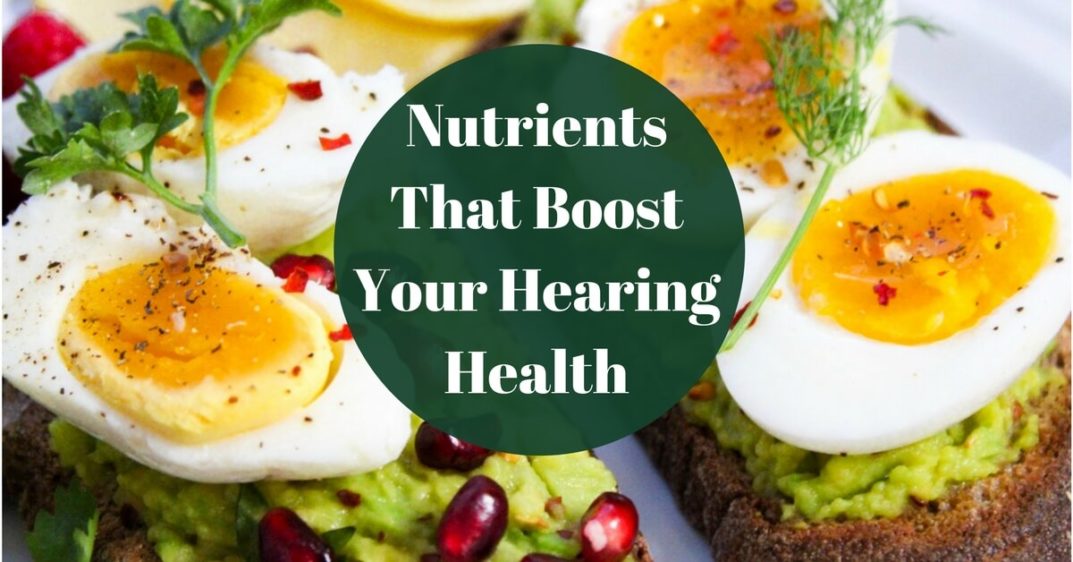A balanced diet rich in nutrients is good for our overall health and well-being. Did you know that certain nutrients can help boost your hearing health as well?
As the third most common medical condition in the United States, hearing loss follows arthritis and heart disease. Affecting 20% of the population, hearing loss often occurs gradually and over a long period of time. As such, people are not immediately aware of the changes in their hearing.
If left untreated, hearing loss could cause negative consequences to your overall health and well-being. For example, hearing loss has been linked to dementia, stress, anxiety, depression, and isolation. Additionally, it is linked to a higher risk for falls, accidents, and hospitalizations.
While there is no definitive proof that there are miracle foods to cure hearing loss, studies have found that certain nutrients and minerals in our diet could help support better hearing health.
Hearing Health and Our Overall Health
As with other systems in our body, our auditory system relies on a healthy supply of blood, carrying oxygen to the inner ear hair cells. These cells are responsible for translating sound waves into neural signals that are received by the brain as sound.
In fact, one of the causes of hearing loss could be issues with one’s cardiovascular system. Fortunately, new studies show that the inclusion of a number of minerals and nutrients in our diets could “help boost hearing or even prevent or delay hearing loss.”
Vitamins Could Help Prevent Noise-Induced Hearing Loss
At the University of Michigan’s Kresge Hearing Research Institute, Dr. Colleen Le Prell’s research has found that “high doses of certain antioxidants reduce noise-induced hearing loss in animals when taken both before and after loud noise.” Supported by the American Hearing Research Foundation, this study involved guinea pigs and high doses of vitamins before exposure to noise. Over five days of study, Dr. Le Prell gave guinea pigs high doses of vitamins A, C, and E, and magnesium, before and after exposure to noise. She found that this treatment helped prevent noise-induced hearing loss. Dr. Le Prell says, “Vitamins A, C, and E and magnesium worked in synergy to prevent cell damage.”
Results show that “pre-treatment presumably reduced reactive elements called free radicals that form during and after noise exposure and noise-induced constriction of blood flow to the inner ear…In the past 10 years, scientists have learned that noise-induced hearing loss occurs in part because cell mitochondria in the ear churn out damaging free radicals in response to loud sounds.” Antioxidants help to reduce the impact of these free radicals on our hearing.
Omega-3 Fatty Acids & Antioxidants
In the Daily Sentinel, Dr. Joe McDermott, audiologist, indicates that omega-3 fatty acids, folic acid, and antioxidants such as vitamins B12, C, D, and E, could support healthy hearing.
Commonly found in salmon, tuna, and sardines, and other fish, omega-3 fatty acids have anti-inflammatory agents that strengthen blood vessels. This is particularly useful to our auditory system, as our inner ear relies on a network of blood vessels to receive oxygen. Studies show that “people who eat two or more portions of fish per week are 42% less likely to develop presbycusis compared with those who do not eat fish on a regular basis.” Omega-3 fatty acids can also be found in other food, such as flaxseed, walnuts, soybeans, and spinach.
Antioxidants may be natural or man-made – either way, they are important in preventing or delaying cell damage in our bodies. Oxidation could produce free radicals, which cause damage to our cells – including our inner ear hair cells. Antioxidants help slow down this process. We can get antioxidants from dark leafy greens and colorful fruits.
Folic acid can be found in goji berries, artichokes, and dark chocolate. Folic acid is an important antioxidant, but researchers have found that people “over the age of 50 years with folate deficiency have been reported to have a 35% higher risk of hearing loss.” Adding folic acid to your diet could help support your hearing health.
Vitamins and Minerals for Better Hearing Health
Both Drs. Le Prell and McDermott list a number of vitamins that boost hearing health. These include: vitamins B12, C, D, and E, zinc, and magnesium.
Adding fish, tofu, red meat, eggs, and low-fat dairy products to your diet will give you a nice supply of vitamin B12. Vitamins C, D, and E are found in colorful fruits and vegetables, such as berries, citrus, bell peppers, broccoli, etc. To add zinc to your diet, have a few freshly shucked oysters! Magnesium is added to your diet through bananas, potatoes, and artichokes.
Visit Us at Comprehensive Ear and Hearing
A well-rounded, nutritious diet is just one aspect of good hearing health. Another component is an annual hearing test, in which you can monitor your hearing abilities. At Comprehensive Ear and Hearing, we offer hearing tests and hearing aid fittings. For more information and to schedule an appointment, contact us today!


